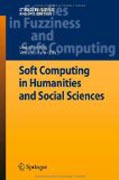
Soft computing in humanities and social sciences
Seising, Rudolf
Sanz González, Verónica
The field of Soft Computing in Humanities and Social Sciences is at a turningpoint. The strong distinction between “science” and “humanities” has been criticized from many fronts and, at the same time, an increasing cooperation between the so-called “hard sciences” and “soft sciences” is taking place in a wide range of scientific projects dealing with very complex and interdisciplinarytopics. In the last fifteen years the area of Soft Computing has also experienced a gradual rapprochement to disciplines in the Humanities and Social Sciences, and also in the field of Medicine, Biology and even the Arts, a phenomenon that did not occur much in the previous years. The collection of this book presents a generous sampling of the new and burgeoning field of Soft Computing in Humanities and Social Sciences, bringing together a wide array of authors and subject matters from different disciplines. Some of the contributors of thebook belong to the scientific and technical areas of Soft Computing while others come from various fields in the humanities and social sciences such as Philosophy, History, Sociology or Economics. Rudolf Seising received a Ph.D. degree in philosophy of science and a postdoctoral lecture qualification (PD) in history of science from the Ludwig Maximilians University of Munich. He is an Adjoint Researcher at the European Centre for Soft Computing in Mieres (Asturias), Spain. Veronica Sanz earned a Ph.D. in Philosophy at the University Complutense of Madrid (Spain). At the moment she is a Postdoctoral Researcher at theScience, Technology and Society Center in the University of California at Berkeley. Veronica Sanz earned a Ph.D. in Philosophy at the University Complutense of Madrid (Spain). At the moment she is a Postdoctoral Researcher at the Science, Technology and Society Center in the University of California at Berkeley. Recent research on soft computing in humanities and social sciences. Carefully edited book on applications of soft computing to human sciences. Written by leading experts in the field. INDICE: Part I Introduction. Part II General Overviews of Soft Computing in Humanities and Social Sciences. Part III Philosophy, Logic and Fuzzy Logic. Part IV Soft Computing, Natural Language and Perceptions. Part V Soft Models in Social Sciences and Economics. Part VI Soft Computing and Life Sciences. Part VII Soft Computing and Arts.
- ISBN: 978-3-642-24671-5
- Editorial: Springer Berlin Heidelberg
- Encuadernacion: Cartoné
- Páginas: 550
- Fecha Publicación: 30/11/2011
- Nº Volúmenes: 1
- Idioma: Inglés
